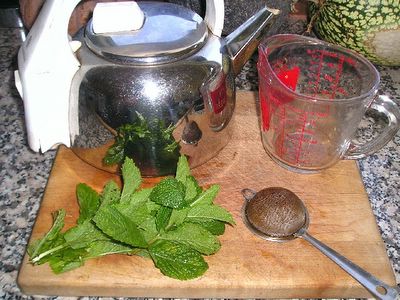Mint
 Arabic Eqama, Nana
Arabic Eqama, Nana French Menthe anglaise, Menthe poivr?e
Hebrew מנתה, נענע Menta, Na'na', Nana
Italian Menta pepe, Menta peperina, Menta piperita
Portuguese Hortel?, Menta
Spanish Hierbabuena, Menta, Piperita
Medicinal virtues:
All Mints are astringent and great strengtheners of the stomach.
Mint is a herb that is useful in all disorders of the stomach, including weakness, loss of appetite, pain and vomiting.
Applied to the forehead or temples, it eases pains in the head.
The heads of young children can he washed with it to help against sores and scabs.
The simple water given to children removes the gripes.
Modern uses:
The plant yields Peppermint Oil, which contains menthol.
It is anti-flatulent, anti-spasmodic (relieving pains in the alimentary canal) and stimulating, and often used in paediatric medicines. Mint removes nausea and flatulence and allays vomiting.
Astringent and emetic (an agent that causes vomiting), it is mainly used for looseness of the bowels being given by infusion. Made too strong, the infusion becomes emetic.
It also stimulates the menstrual flow.
The dosage is one to three drops on sugar.
Peppermint Water, used for griping pains in the tummy, is made by adding a few drops of the oil to a pint of distilled water (Aqua Mentha Pip. Dest.) and administering in doses of 1/2-i fl oz (14-28 ml).
 Chai Na'na (Mint Tea)
Chai Na'na (Mint Tea)1 tablespoon Chinese green tea
800ml boiling water
8 leaves fresh mint
Note:
Traditionally served in small tea glasses (istikan - available from most Middle Eastern and Indian shops).
Add sugar to individual glasses if desired.



Peppermint Tea, made by infusing 28 g of the herb in 1 Pt (568 ml) of boiling water, is good used early in colds or fevers. Taken hot, the infusion induces perspiration and is valuable in fevers and inflammatory conditions. The tea is also helpful in treating insomnia, anxiety and dizziness. (www.magdalin.com)





0 Comments:
Post a Comment
<< Home ::